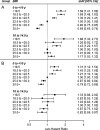Obesity and Longer Term Risks of Dementia in 65-74 Year Olds
- PMID: 30726871
- PMCID: PMC6512743
- DOI: 10.1093/ageing/afz002
Obesity and Longer Term Risks of Dementia in 65-74 Year Olds
Abstract
Background: overweight or obesity at ages <65 years associates with increased dementia incidence, but at ≥65 years estimates are paradoxical. Weight loss before dementia diagnosis, plus smoking and diseases causing weight loss may confound associations.
Objective: to estimate weight loss before dementia diagnosis, plus short and longer-term body mass index associations with incident dementia in 65-74 year olds within primary care populations in England.
Methods: we studied dementia diagnosis free subjects: 257,523 non-smokers without baseline cancer, heart failure or multi-morbidity (group A) plus 161,927 with these confounders (group B), followed ≤14.9 years. Competing hazard models accounted for mortality.
Results: in group A, 9,774 were diagnosed with dementia and in those with repeat weight measures, 54% lost ≥2.5 kg during 10 years pre-diagnosis. During <10 years obesity (≥30.0 kg/m2) or overweight (25.0 to <30.0) were inversely associated with incident dementia (versus 22.5 to <25.0). However, from 10 to 14.9 years, obesity was associated with increased dementia incidence (hazard ratio [HR] 1.17; 95% CI: 1.03-1.32). Overweight protective associations disappeared in longer-term analyses (HR, 1.01; 95% CI: 0.90-1.13). In group B, (n = 6,070 with incident dementia), obesity was associated with lower dementia risks in the short and longer-term.
Conclusions: in 65-74 year olds (free of smoking, cancer, heart failure or multi-morbidity at baseline) obesity associates with higher longer-term incidence of dementia. Paradoxical associations were present short-term and in those with likely confounders. Reports of protective effects of obesity or overweight on dementia risk in older groups may reflect biases, especially weight loss before dementia diagnosis.
Keywords: dementia; epidemiology; obesity; older people; paradox.
© The Author(s) 2019. Published by Oxford University Press on behalf of the British Geriatrics Society.
Figures


References
-
- Kivipelto M, Ngandu T, Fratiglioni L et al. . Obesity and vascular risk factors at midlife and the risk of dementia and Alzheimer disease. Arch Neurol 2005; 62: 1556–60. - PubMed
Publication types
MeSH terms
LinkOut - more resources
Full Text Sources
Medical

